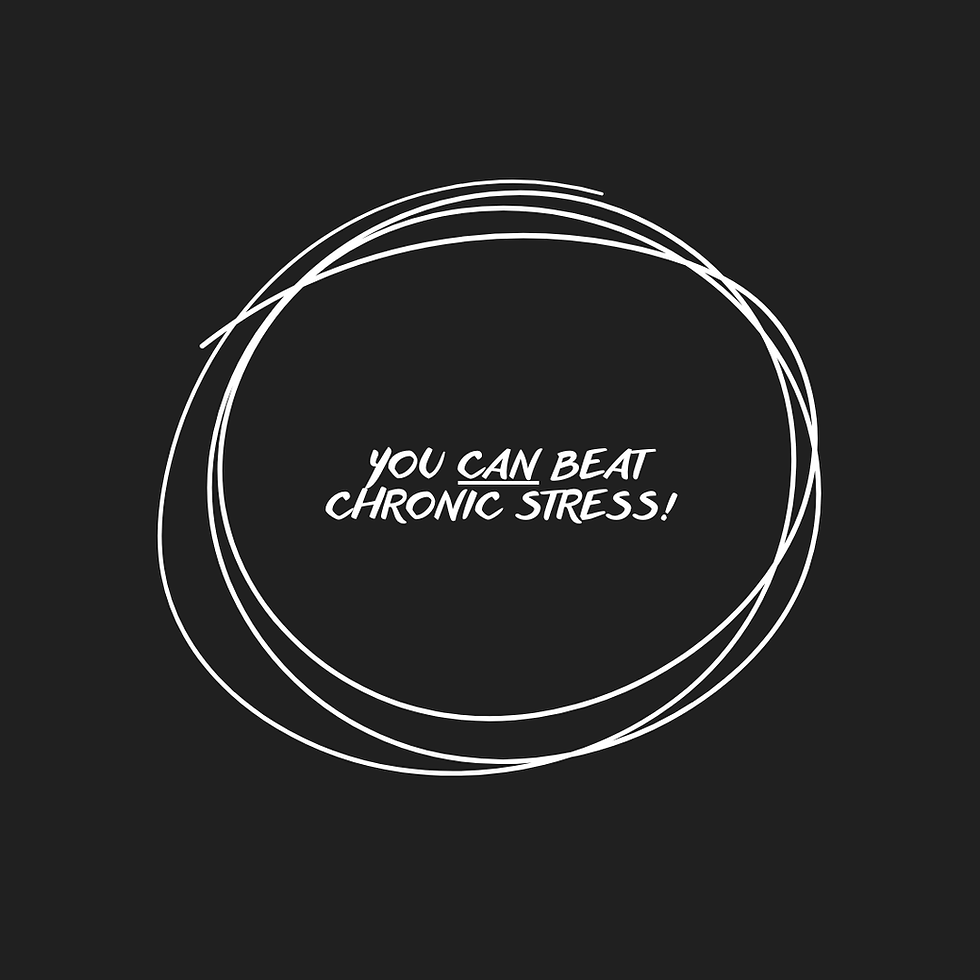What Happens to Your Body Under Chronic Stress and How to Find Balance
- brandiholder1
- May 29, 2024
- 3 min read
Picture this: you're facing a tight deadline, juggling multiple projects, or dealing with a challenging relationship. Your heart races, your muscles tense, and your mind kicks into high gear.
Sound familiar?
We all know the feeling of being stuck in overdrive, hustling hard to reach our goals and conquer our to-do lists. But have you ever considered how your body's natural stress response might impact your overall functioning and well-being?
Let's talk about the Sympathetic Nervous System (SNS) and the Parasympathetic Nervous System (PNS), two key players in regulating our body's response to stress and rest.
The Stress Response: Your Body's Built-In Alarm System
When we're in go-go-go mode, our SNS is activated, triggering the release of stress hormones like cortisol and adrenaline. This "fight or flight" response can be helpful in short bursts, giving us the energy and focus we need to tackle challenges head-on.
However, constant SNS engagement can take a toll on our physical and mental health, leading to:
Anxiety, irritability, digestive issues, and difficulty sleeping
Impaired cognitive function and decision-making
Decreased creativity and problem-solving abilities
Weakened immune system and increased vulnerability to illness
Difficulty regulating emotions and maintaining positive relationships
In other words, being stuck in "go-mode" can seriously hamper your ability to show up as your best self in work and life.
The Rest and Digest Mode: Your Body's Built-In Chill Pill
On the flip side, our PNS is responsible for the "rest and digest" response, helping us to relax, unwind, and recover from stress. When our PNS is activated, we experience
Sense of calm, improved digestion, and better sleep
Lowered heart rate and blood pressure
Enhanced immune function and tissue repair
Improved cognitive function and emotional regulation
The key to optimal functioning is finding a balance between these two systems. While short periods of stress can be motivating and productive, it's crucial to prioritize rest and recovery to avoid burnout and chronic stress.
A note about the severe consequences of long-term stress...
The Long-Term Health Consequences of Chronic Stress
When stress becomes chronic, it can lead to serious health problems, including:
Cardiovascular diseases
Immune dysfunction
Metabolic disorders such as insulin resistance, obesity, and type 2 diabetes
Development of depression, anxiety disorders, and other mental health issues
Accelerated cellular aging, cognitive decline, and increased risk of age-related diseases
We all know chronic stress is bad, and nobody wants it or the conditions that come with it. So what can we do?
Finding Your Balance: Strategies for Optimal Functioning
Take a moment to reflect on your current stress levels and how often you do something that feels centering and calming. It's probably far less than you would like.
Here are a few simple strategies to support your PNS and invite the antidote to the stress response:
Practice deep breathing exercises
Engage in relaxing activities
Spend time in nature
Connect with others for social support
Prioritize sleep (aim for 7-9 hours of quality sleep each night)
Set boundaries and create space for self-care and renewal
Practice mindfulness and meditation
Engage in regular physical exercise, particularly low-intensity exercises like walking or gentle yoga

What does this look like in action?
Start small and take a few minutes each day to give yourself a break. This can look like a 10-minute walk, a 5-minute meditation, or talking to a positive and uplifting friend about something you are excited about.
By incorporating these strategies into your daily life, you can train your body to switch between stress and rest modes more effectively, allowing you to show up as your best self in all areas of life.
Remember, success isn't just about hustling – it's about caring for yourself and finding a sustainable balance. By prioritizing self-care, you'll be better equipped to achieve your goals, maintain positive relationships, and enjoy a more fulfilling life.
Need help with this?
As a high-achieving founder or solopreneur, you've likely experienced the toll that chronic stress can take on your physical and mental well-being. But what if you had a dedicated, experienced coach who understands your unique challenges and can help you navigate them with confidence and clarity?
That's where I come in. Through my transformative coaching program, I'll help you:
Align your life and business with your deepest values and aspirations
Create a personalized growth plan to achieve your goals with clarity
Develop unshakable confidence and resilience
Improve your internal dialogue and reduce stress
Amplify your story to attract ideal clients and top talent
Imagine waking up each day feeling energized, focused, and in control, knowing you have the tools and support you need to achieve your goals without sacrificing your well-being.
If you're ready to explore some exciting changes, I invite you to book a call with me today.


